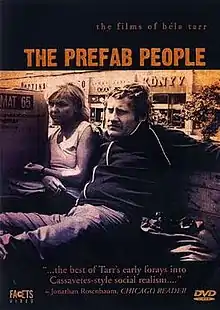| The Prefab People | |
|---|---|
 DVD cover | |
| Directed by | Béla Tarr |
| Screenplay by | Béla Tarr |
| Starring | Judit Pogány Róbert Koltai |
| Cinematography | Barna Mihók Ferenc Pap |
| Edited by | Ágnes Hranitzky |
Release date |
|
Running time | 102 minutes |
| Country | Hungary |
| Language | Hungarian |
The Prefab People (Hungarian: Panelkapcsolat) is a 1982 Hungarian black-and-white drama film directed by Béla Tarr. Although the film was made in 1982, it was not shown in Russia until July 4, 2011. The film earned special mention in the 1982 Locarno International Film Festival. The film has several run times (72 min., 84 min., or 102 min. depending on the version), and is shot in 35 mm.[1]
Reception
The Prefab People received generally positive reviews from critics, and has been ranked with Tarr's best early works. Rotten Tomatoes reports a 100% approval rating from critics, based on six reviews, and an average rating of 7.5/10.[2] Writing for Village Voice, Michael Atkinson called the film an "unrelenting, smell-the-sour-breath portrait of a blue-collar marriage dissolving under pressure from Communist-era poverty, masculine inadequacy, and restless depression."[3]
Jonathan Rosenbaum of Chicago Reader argued it was "the best of his early forays into Cassavetes-style social realism."[4] In 2003, web-based film critic Jeremy Heilman called The Prefab People the best of [Tarr's] early works because it achieves such a degree of intimacy that its lack of ostentatious filmmaking never impedes its ability to observe its characters."[5]
References
- ↑ "Panelkapcsolat". IMDb.
- ↑ "Panelkapcsolat (The Prefab People)". Rotten Tomatoes.
- ↑ Atkinson, Michael (5 October 2007). "Hungarian Master Keeps Feet on the Ground in Early Works". Village Voice. Retrieved 21 December 2014.
- ↑ Rosenbaum, Jonathan (4 March 2003). "The Prefab People". Chicago Reader. Retrieved 21 December 2014.
- ↑ Heilman, Jeremy (3 March 2003). "The Prefab People (Bela Tarr, 1982)". Moviemartyr.com. Retrieved 21 December 2014.
External links